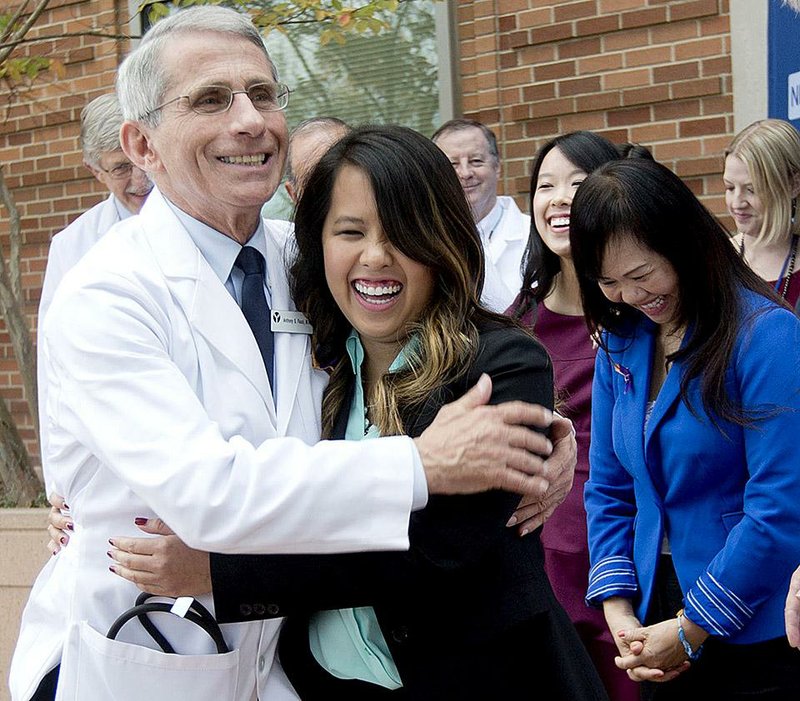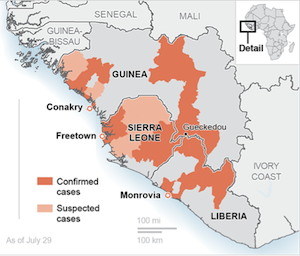NEW YORK -- Disease investigators are looking for anyone who had contact since Tuesday morning with New York City's first Ebola patient, though health officials said Friday that the risk to the public was small and they were acting out of an abundance of caution.
RELATED ARTICLES
http://www.arkansas…">Reactions mixed in NYC http://www.arkansas…">UA nurse educates on Ebola virus
Meanwhile, a nurse who became ill with Ebola earlier this month after caring for a sick patient in Dallas has recovered and was released from a Maryland hospital Friday. She later met with President Barack Obama at the White House.
In New York, three people who had contact with the infected patient, Dr. Craig Spencer, have been quarantined, and investigators have compiled a detailed accounting of his movements in the days before he was placed in isolation Thursday at Bellevue Hospital.
New York health officials said initial reports were incorrect that Spencer, 33, had a 103-degree fever when he notified authorities Thursday that he was ill. His fever was actually 100.3 degrees. Officials attributed the mistake to a transcription error and said the lower temperature made it highly unlikely that he spread the disease before he went to the hospital.
Spencer had been working with Doctors Without Borders in Guinea, where he treated Ebola patients. He left Africa on Oct. 14 and returned to New York City on Oct. 17, according to a city official.
Since March, three international staff members of the group and 21 locally employed staff members have fallen ill while battling the Ebola outbreak in Guinea, Liberia and Sierra Leone, according to the group. Thirteen have died. Spencer is the first worker out of more than 700 foreign staff members deployed so far to West Africa to develop symptoms after returning home.
Spencer was in stable condition Friday, said Dr. Mary Bassett, the city's health commissioner. The moment he was diagnosed with the virus, a discussion began about how best to treat him, officials said. Nearly all of the patients cared for in the United States have received some form of experimental treatments, and doctors were discussing what, if any, of those they will use in Spencer's case.
Doctors at Bellevue were consulting with experts at Emory University Hospital in Atlanta and the University of Nebraska Medical Center in Omaha, both of which have successfully treated Ebola patients.
As a hazardous-materials team arrived to sanitize Spencer's apartment in Harlem, public officials took to the airwaves to reassure residents that the risk of infection to the general public was small.
"New Yorkers who have not been exposed to an infected person's bodily fluids are simply not at risk," Mayor Bill de Blasio said in a news conference Friday afternoon.
"We have the finest public health system, not only anywhere in the country but anywhere in the world," he said. "We are fully ready to handle Ebola."
Much of officials' attention focused on Spencer's movements on the night before he reported feeling ill.
On Friday, officials added some new details about those movements. He traveled on the A and L subway lines to Brooklyn, where he went bowling, then took a taxi back to Manhattan on Wednesday evening. He assured officials that he was not symptomatic at that time.
Earlier Wednesday, he went for a 3-mile jog along Riverside Drive. On Tuesday -- the day Spencer first began to feel sluggish, according to what he told health investigators -- he visited the High Line, a park frequented by tourists, and ate a meal at The Meatball Shop at 64 Greenwich Ave. Health workers are visiting every location Spencer visited, Bassett said.
Bassett said authorities are reaching out to anyone who had contact with Spencer since 7 a.m. Tuesday "out of an abundance of caution."
The Ebola virus can be transmitted only through bodily fluids after an infected person begins to show symptoms. At the onset of illness, the amount of virus in the body is generally low, so the risk of infection is considered small.
As the illness progresses, the amount of virus in the body multiplies and so does the risk of infection.
Spencer's fiancee, Morgan Dixon, who lives with him, has been quarantined at Bellevue Hospital. Two other friends with whom he had contact also have been quarantined.
None of them currently show any symptoms of illness.
'Cured of Ebola'
Nina Pham, the Dallas nurse, said she felt "fortunate and blessed to be standing here today," as she left the National Institutes of Health's Clinical Center in Bethesda, Md., where she had been treated since she arrived Oct. 16 from Texas Health Presbyterian Hospital Dallas.
During Friday's meeting with Obama, Pham got a hug from the president in the Oval Office at the White House.
White House spokesman Josh Earnest called the meeting with Obama "an opportunity for the president to thank her for her service."
Outside the Bethesda hospital, she got hugs from one of the doctors who oversaw her care.
Pham thanked her health care teams in Dallas and at the National Institutes and singled out fellow Ebola survivor Dr. Kent Brantly, thanking him for donating plasma as part of her care. Brantly has recovered from Ebola after becoming infected in Liberia in July.
Pham said, "I believe in the power of prayer, because I know so many people all over the world have been praying for me. I join you now in prayer for the recovery of others."
Dr. Anthony Fauci, infectious disease chief at the National Institutes, told reporters that five consecutive tests showed no virus left in Pham's blood. Five tests is way beyond the norm, he stressed, but his team did extra testing because the National Institutes is a research hospital.
"She is cured of Ebola. Let's get that clear," Fauci said.
Fauci also said it was not clear whether Brantly's donated plasma was a factor in Pham's recovery.
"It's virtually impossible to say that this is the thing that did it," Fauci said.
Pham stood throughout the approximately 20-minute news conference and was joined by her mother and sister. She read from a prepared statement and took no questions, but she called her experience "very stressful and challenging for me and for my family."
Pham is one of two nurses in Dallas who became infected with Ebola while treating Thomas Eric Duncan, who traveled to the United States from Liberia and died of the virus Oct. 8. The second nurse, Amber Vinson, is being treated at Emory University Hospital in Atlanta, which on Friday issued a statement saying she "is making good progress" and that tests no longer detect the virus in her blood.
Vinson is still hospitalized, however, for "supportive care," a spokesman said, and there is no date scheduled for her discharge.
Capitol Hill questions
The cases of Ebola in the U.S. have left lawmakers on Capitol Hill wondering why stronger steps aren't being taken to quarantine medical workers.
During a Friday morning congressional hearing, U.S. Rep. Darrell Issa, R-Calif., used the New York case to step up his criticism of the Obama administration's response to the illness.
"I think we all know that the system is not yet refined to where we could say it is working properly," Issa told the House Committee on Oversight and Government Reform, which he leads.
Issa also questioned whether the administration chose the correct person when it named Ron Klain as its Ebola coordinator.
U.S. Rep. Trey Gowdy, R-S.C., is one of several lawmakers who have recently called on Obama to block foreigners in the Ebola-affected countries from coming to the United States.
But Bruce Johnson, president of SIM USA, a Christian organization based in North Carolina, has said its staff members are told to follow guidelines established by the federal Centers for Disease Control and Prevention for their first 21 days in the U.S. Beyond that, he said, they are told to avoid crowded public areas.
Johnson said his workers would not be deterred from serving in Ebola-stricken countries if they were required to remain isolated in their homes for 21 days upon their returns to the U.S. But such measures could discourage volunteers, he said.
Some witnesses at the hearing cast the government's response and preparedness in a harsh light.
John Roth, the Department of Homeland Security's inspector general, said the department had not adequately prepared for an epidemic. The department "may have too much of some equipment and too little of others," he said.
There are 200,000 respirators that are past their expiration dates, he said. His office found drugs that were not stored properly, forcing the department to recall them.
Deborah Burger, a co-president of National Nurses United, who also testified in the hearing, said that while new CDC guidelines represent progress, they are unclear on which protective equipment is most effective for caregivers, leaving it up to hospitals to decide that.
The "lack of mandates and shifting guidelines and reliance on voluntary compliance," she said, "has left caregivers vulnerable to infection."
In the global effort to fight the outbreak, public health authorities said Friday in Geneva that they hoped to begin trials of Ebola vaccines in West Africa as early as December.
"Vaccine is not the magic bullet," Dr. Marie-Paule Kieny of the World Health Organization said at a news conference. "But when ready, they may be a good part of the effort to turn the tide of this epidemic."
Kieny, assistant director general for health systems and innovation for the Geneva-based organization, spoke Friday about the conclusions reached in a meeting the day before at which government officials, drug companies and others discussed how best to test and possibly deploy vaccines.
Manufacturers have committed to having millions of vaccine doses available in 2015, with hundreds of thousands ready by the first half of the year, she said.
Two experimental vaccines are already being tested for safety in healthy volunteers in the U.S. and other countries outside the outbreak region. One is being developed by the National Institutes of Health and GlaxoSmithKline, and the other by the Canadian government and NewLink Genetics.
At least five other vaccines could enter human testing in the first few months of 2015, Kieny said.
Nearly 4,900 people have died in the Ebola outbreak, most of them in the West African nations of Guinea, Liberia and Sierra Leone.
In one of the latest cases of the virus' spread in the region, officials in nearby Mali said Friday that the country's first patient with Ebola, a 2-year-old girl, died while being treated at a hospital.
The WHO warned Friday that many people in Mali are at high risk of catching Ebola because the toddler was bleeding from her nose as she traveled on a bus to Mali from Guinea.
The U.N. agency is treating the situation as an emergency since many people may have had "high-risk exposures" to the child during her journey through several towns in Mali, including two hours in the capital, Bamako. The girl was traveling with her grandmother.
An initial investigation by the WHO has identified 43 people, including 10 health workers, the child came into close contact with who are being monitored for symptoms and are in isolation.
Information for this article was contributed by Marc Santora, Alan Feuer, Sheri Fink, Matt Flegenheimer, Kia Gregory, William K. Rashbaum, Sabrina Tavernise, Andrew Siddons, Michael Paulson and Andrew Pollack of The New York Times; and by Jessica Gresko, Lauran Neergaard, Jim Kuhnhenn, Marilynn Marchione, Mike Stobbe, Maria Cheng, Malcolm Ritter, Erica Werner, Matthew Daly, Edith M. Lederer, Cameron Young, Sarah DiLorenzo, Boubacar Diallo, Jonathan Paye-Layleh, John Heilprin and Baba Ahmed of The Associated Press.
A Section on 10/25/2014

